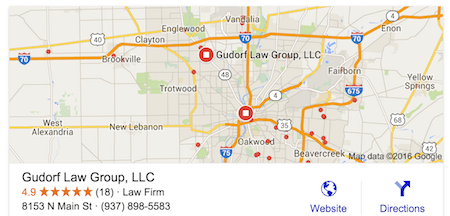Menu
January 30th, 2016
We’re back! After a little hiatus through the holidays we are geared up and ready to drop knowledge in 2016.
The question this week came to us from multiple clients, but most recently from Olga Guzhva, a Belleview, WA Immigration Attorney. Olga signed up for our Local Marketing Fundamentals service, which helps law firms manage and promote their physical office locations in local and mobile searches. You can learn more about the service and audit your location for free at this link.
Ok, on to the question. There are pros and cons to having multiple websites and it’s a hotly contested issue. Overwhelmingly we make the argument that having one website usually is best. But, in our experience there are some reasons that could justify having multiple websites.
Four Reasons in Favor of Multiple Websites
Individuality at a Larger Firm
At larger law firms there are committees — lots and lots of committees. Pushing through any initiative on the firm’s main website can take months. This can be a real hassle for an attorney who is trying to develop a book of business and establish him- or herself online as an authority. The solution to this may be an individual website or blog that is separate from the firm’s main website. With an individual blog or website, once initially approved by the committees, an individual attorney then has a platform to do his or her own thing.
Totally Unrelated Practice Areas
Sometimes it’s just too damned hard to put some practice areas side by side — say complex government contracts and DUI defense. This is especially hard for solos and small firms that may have eclectic experiences and interests. Even though an attorney may be great at more than one area of practice, it may be hard to create synergy between those two areas, and each may require wildly different marketing strategies. In our example, a slogan like “The Government Acts Drunk and So Did You” may get the job done, but separate websites may also be the way to go.
Niche or Unbalanced Marketing
When a firm has multiple practice areas and chooses to market one of them heavily online, this can create a perceived imbalance on the website. For instance, if a general practice firm does family law, business law and real estate — but only wants to promote family law organically in search engines — the firm will need to generate a lot of content on that topic. So, even though family law may represent 33% of the firm’s revenue, it could grow to represent 90% of the content on the firm website. This imbalance may create a perception problem for the firm’s business and real estate referrals and clients.
Page 1 Dominance
If a firm has achieved consistent placement on page 1 search results, they may opt to fire up a second website simply to try and lock down another spot on page 1 — with their separate website — to kick another firm off. Why not? Did it once, do it again!
Similarly, a second website may also be a good strategy if a firm has achieved high organic rankings in one city or region and they want to expand to another geographic area without putting their existing high rankings at risk.
Four Arguments Against Multiple Websites
Cost and Hassle
Quite simply, when you have multiple websites you have multiple expenses and multiple places to manage your firm’s identity online. It creates more overhead.
Local Search Confusion
In today’s landscape, a search for a law firm often pulls up special local search results that include a map and contact information. Like this:
The problem is that local search results only make room for one website per physical location. This means that law firms have to choose which website should be the primary one. If a firm does not take control of this, then it will be pretty random. Going back to our DUI / Government example, this means a potential business government contract client may be taken to the firm’s DUI defense website.
All Sites Will be Seen by Referrals
When a relevant topic is searched, likely only your website with unique content targeting that topic will show up. But, when your firm's name or a specific attorney's name is searched, both / all your sites will show up. The people that are searching by name are almost always referrals and existing clients interested in only one side of your practice. Here again, this can potentially create confusion over the firm’s identity and brand.
Spread Thin
Most of the firms we work with are stretched to the max. They’re juggling practicing law, running a business, marketing and trying to have a life. If you are trying to promote multiple websites it means that your resources are being divided between multiple assets. If an attorney has the time to write 1 blog a month but has 4 websites that need attention, it may be better to consolidate the effort so that one site is getting all the attention instead of having four sites that are in jeopardy of looking stale.
So there you have it, four situations where separate websites are justified and four serious considerations to think about before proceeding. We hope this helps clear up the debate on this feisty topic.
Categories: Question of the Week













